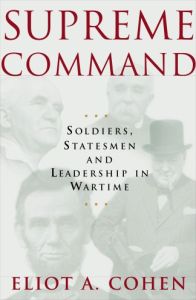Join getAbstract to access the summary!

Join getAbstract to access the summary!
Eliot A. Cohen
Supreme Command
Soldiers, Statesmen, and Leadership in Wartime
Free Press, 2003
What's inside?
Lincoln, Churchill, Clemenceau and Ben-Gurion conducted war their own way — whether the generals liked it or not.
Recommendation
This book achieves excellence on several levels and offers an absorbing portrait of leadership under difficult circumstances. Author Eliot A. Cohen presents an impressive analysis of an especially important issue, the balance between civilian and military leadership, which he uses as a paradigm for leadership relations and strategy. His discussion is easily accessible to the general reader, always scholarly but never pedantic, and leaves one in a mood to find anything else this author may have written. Cohen is not afraid to defy conventional wisdom, as he does when he blames the Vietnam failure not on too much, but rather on too little, civilian meddling in military affairs. getAbstract.com finds it difficult to criticize this work, except on the grounds that it is so good, we wish there were more of it.
Summary
About the Author
Eliot A. Cohen is Professor of Strategic Studies at the Paul H. Nitze School of Advanced International Studies at Johns Hopkins University. He has written books and articles on various military and national security subjects, and is a consultant with the Department of Defense and a member of the Defense Policy Board.



















Comment on this summary